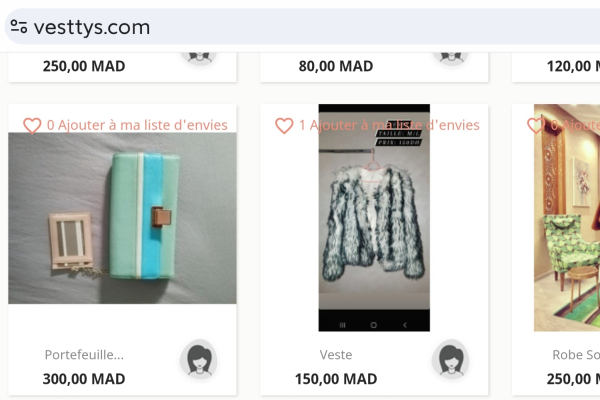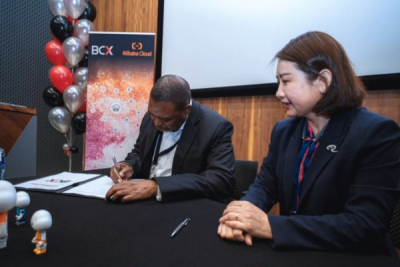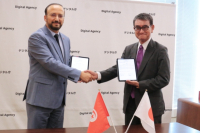He aims to improve access to healthcare services in Africa. With Zinacare, he offers over 20 different tests, ranging from sexually transmitted infections to chronic diseases and even Covid-19.
Philip Mngadi (photo) is a South African serial entrepreneur with a decade of experience building products in Africa and Europe. He is the founder and CEO of Zinacare, a company revolutionizing access to essential health testing services in Africa.
His academic career began at University College Cork, where he graduated with a Bachelor of Laws in 2017. After his studies, he worked for Stripe in Ireland as a payments specialist before embarking on entrepreneurship.
In 2020, he launched Zinacare, allowing access to more than 20 different tests, which range from sexually transmitted infections to chronic diseases and COVID-19. He enables users to order test kits from the Zinacare platform and get them delivered to their homes or offices. Users can also send their samples to Zinacare's partner laboratory, which sends back the results online confidentially and securely. Zinacare also offers medical consultation, prescription, and post-test follow-up services.
Under the leadership of Philip Mngadi, Zinacare has received accreditation from the Health Professions Council of South Africa, the South African Health Products Regulatory Authority, the South African National Accreditation System, and the International Organization for Standardization. In addition, the company succeeded in attracting over 20,000 customers in 2022 and is on track to double the figure in 2023.
In June 2023, the startup was selected by Google to be part of the annual Black Founders Fund cohort in Africa. It has also joined StartUp Health's global community of healthcare founders and investors.
In addition to Zinacare, Philip Mngadi also founded Pago, a low-cost mobile micropayments platform for the informal sector to enable an inclusive economy by digitizing remittances through the use of blockchain technology. The company was incubated by the AlphaCode Incubate initiative in 2018.
In 2019, the serial entrepreneur also founded Tuma, a fintech that enables users to transfer funds from any instant money wallet such as eWallet, CashSend, and Send-iMali, to any bank account in South Africa.
Melchior Koba
The platform is a Moroccan version of the vide dressing concept its founder discovered during her studies in France.
Vesttys is an e-commerce platform developed by a Moroccan startup. On the one hand, it lets users sell old items and, on the other, buy new ones at attractive prices. The Tangier-based startup behind it was founded in 2020 by Mariam Ben Omar.
Defining itself as a vide-dressing platform, Vesttys aims to develop the second-hand market in the Cherifian kingdom.
"During my years of study in France, I realized at one point that I had a shopping addiction, I ended up with several items that I didn't use. Most of them were left with the label. [...] A friend told me about a platform where I could put my clothes up for sale: a sort of virtual dressing room. So I became a seller myself and created my own dressing room. A few years later, I returned to Morocco for good, and that's when I began to realize the importance of this platform in my daily life," explains Mariam Ben Omar.
Vesttys was born from that realization. Currently, it has no mobile app. Unregistered users can nevertheless visit its web platform and check the items available for sale, from traditional and modern clothing to beauty products, children's items, accessories, and more.
To post or buy an item, users need to create a free account with an email address and link a credit card to activate the account.
The platform does not charge commissions on user purchases or sales. It earns money through a feature called “Boost”. This feature allows users to make their dressing rooms or items appear at the forefront. This means that when users search from specific items, the listings of “Boost” subscribers will appear first.
Adoni Conrad Quenum
Egyptian insurtech company Amenli announced on Monday, October 9 the successful completion of a $1 million financing round. The deal was led by Alter Global, a venture capital fund focused on emerging markets, with the participation of Qatar Insurance Group and Digital Ventures Partners. The funds will be used to develop its technology and accelerate growth.
Bolt's current operating license is due to expire in 17 days. Nevertheless, Kenyan authorities are calling on the Estonian company to address lingering issues or cease operations.
Kenya's National Transport and Safety Authority (NTSA) has rejected the renewal of VTC company Bolt's operating license in the country, local media report. The decision follows alleged violations by Bolt, including illegal commissions and booking fees higher than those set by the Ministry of Transport.
"Please note that the Authority is not able to proceed with the renewal of your operator license until the issues raised by drivers and their representatives are satisfactorily addressed and rectified," said Cosmas Ngeso, Deputy Director and Licensing Officer, in the letter sent to Bolt on behalf of NTSA Director General George Njao.
Indeed, the Estonia-based company, which entered Kenya as Taxify in 2016, obtained a license from Transport Network Company on October 28, 2022. At the time, it committed to complying with the regulations in force in the country, in particular the law which stipulates that the commission collected from drivers using the app is set at 18%. Nevertheless, in recent months Bolt has been accused of introducing "illegal" booking fees.
According to the VTC company officials, the booking fee is an additional charge added to each trip. "The booking fee assists with covering support and enhanced technological features that ensure an even more efficient service on our platform," explained Linda Ndungu, Bolt's country manager.
It is worth noting that the company has promised to address the issues before its current license expires, in about 17 days. Currently, it offers its services in 16 cities across Kenya. In Africa, it is present in Kenya, Nigeria, Ghana, Uganda, Tanzania and Tunisia.
Samira Njoya
The services materialize the partnership agreement signed by the two companies in October 2022. After South Africa, they plan on entering countries like Botswana, Namibia, Mozambique, and Zambia.
Last week, BCX, a subsidiary of telecoms operator Telkom, launched its cloud service, dubbed Africa Local Public (ALP), in partnership with Chinese e-commerce giant Alibaba. Data will be stored in two centers in South Africa's largest city, Johannesburg.
"This strategic initiative addresses the rising demand for secure, scalable, and high-performance cloud solutions that cater to the distinct requirements of South African businesses.[...] The launch of ALP cloud serves multiple purposes, one of which accentuates our dedication to maintaining a local presence. As a result, when our customers opt for BCX local cloud services, they will be directly connecting with and supported by a South African company,” explains Jonas Bogoshi, CEO of BCX.
Data centers, whose role is to process, secure, and store digital data, are of vital importance in the digital transformation process underway on the continent. They will enable African countries to acquire digital sovereignty, i.e. the ability to act in cyberspace and to ensure that their rules are respected by the various players in the virtual world. Africa accounts for barely 1% of the data centers installed worldwide and South Africa hosts more than half of them.
The new partnership is part of South Africa's national data and cloud computing policy. Among other things, this policy aims to create an environment conducive to the development of the data ecosystem and to promote access to data and cloud services. BCX and Alibaba are also planning to build new centers in Cape Town (South Africa), Botswana, Mozambique, Namibia, and Zambia.
Adoni Conrad Quenum
When it comes to scientific research, Africa still lags behind the rest of the world. To bridge this gap, new initiatives are being launched to encourage it on the continent.
On Thursday, October 5, Google unveiled the list of 11 African startups selected for the first cohort of its Google for Startups Accelerator: AI First program, which aims to support startups that use artificial intelligence to tackle Africa's unique challenges.
The selected startups come from South Africa (Avalon Health), Ghana (Chatbots Africa), Senegal (Lengo AI), Uganda (Logistify AI), Ethiopia (Telliscopen, Garri Logistics), Kenya (Dial Afrika Inc, Fastagger Inc ) and Nigeria (Famasi Africa, Izifin, Vzy). They were chosen from a vast pool of innovative talent, offering solutions to global problems through the use of artificial intelligence.
They will each benefit from a 10-week acceleration path, an allocation of $350,000 in Google Cloud credits, mentoring sessions, technical advice, and networking opportunities to enhance their reach and impact.
Ultimately, the training will enable these specialized startups to benefit from Google's vast network to further develop their businesses and promote the use of AI in their respective countries at a time when McKinsey Global Institute report indicates that AI could increase Africa's GDP to $1.3 trillion by 2030. This demonstrates the undeniable potential of artificial intelligence to power solutions and drive economic growth.
"Our chosen startups for the ‘AI First’ program embody this vision, leveraging AI in pioneering ways to address both local and global challenges. We’re here excited to support and amplify their impact," said Folarin Aiyegbusi, Google’s Head of Startup Ecosystem, Africa.
Samira Njoya
Thanks to its innovative programs and ongoing support for women entrepreneurs, Ndoto plays a crucial role in promoting the economic empowerment of women on the continent.
Ndoto Hub is an innovation space dedicated to women who want to create and develop social and economic enterprises in Africa. Founded in 2017, it offers women access to shared workspace, information, mentoring, networks, and markets tailored to their personal and professional growth. The hub is supported by a digital learning platform and member-led community groups.
Its activities and programs aim to empower women entrepreneurs under the age of 35 in various areas, such as personal development, business development, leadership, financial management, digital, problem-solving, and more. Ndoto Hub also offers financing opportunities, partnerships, and introductions to investors, potential customers, and opinion leaders.
Its Ndoto Digital incubator enables women to learn, start, and develop a business. It also provides them with the experts and practical tools they need to learn.
Present in Dar es Salaam and Arusha, Ndolo wants to propel the next generation of innovative and successful women entrepreneurs. It is supported by a market-driven curriculum designed to meet the needs of young women entrepreneurs.
Ndoto Hub is therefore a key player in the African entrepreneurial ecosystem. A member of the AfriLabs network, it is supported in its efforts by Digital Opportunity Trust Tanzania and the Government of Canada, as well as other national and international institutions.
Melchior Koba
He is an entrepreneur in the field of renewable energy. As a team lead at energy startup NeedEnergy, he brings clean energy solutions to the world's most remote regions.
Leroy T. Nyangani (photo) is the team lead and one of the co-founders of NeedEnergy, a Zimbabwean startup that uses artificial intelligence to optimize renewable energy microgrids in sub-Saharan Africa and remote parts of the world.
A chemical engineer by training, he graduated from the Zimbabwe National University of Science and Technology with a Bachelor's degree in 2019. He co-founded NeedEnergy in 2016 with the ambition of deploying renewable and clean energy assets to over 200 million people by 2030.
NeedEnergy provides smart data to renewable energy microgrid operators, by analyzing meteorological data. It aims to extend access to clean energy in sub-Saharan Africa as well as in remote areas of the world.
Via its platform memeza.ai, NeedEnergy collects data from various IoT (Internet of Things) devices such as smart gas meters and home energy monitors to analyze the energy needs of the distribution network. This data is used to form models, helping to identify opportunities for the deployment of renewable energy generation assets. Once deployed, these assets are monitored and managed via the platform to guarantee their power and performance.
On September 21, 2023, the company was selected as part of the inaugural cohort of the Google for Startups Accelerator: Climate Change program for startups in the Middle East and Africa.
Prior to NeedEnergy, Leroy T. Nyangani founded Mornay Foods, which offers an on-demand food ordering service and a restaurant that mainly targets university campuses and office parks. His professional career began in 2015 at Bakers Inn Zimbabwe, a bakery, where he was a production and packaging specialist.
He has been recognized as an innovative entrepreneur committed to the energy transition. He was selected as a Unreasonable Fellow by Unreasonable Group, an organization that supports entrepreneurs who solve the world's greatest challenges. Since March 2023, he is a Techstars Entrepreneur following the selection of NeedEnergy as part of the 2023 Class of the Equinor & Techstars Energy Accelerator.
Melchior Koba
To facilitate financial and commercial transactions for local populations, African tech entrepreneurs are multiplying financial technology solutions, some more interesting than others.
Abela is a mobile application developed by a South African startup and launched in 2020. It enables access to online banking services via its mobile app.
"We live in an economy that is going cashless, and people are losing out because of it. The global pandemic has only accelerated this movement. [...] Today, 10.4 million South Africans have seen their monthly income decrease by up to 75 percent due to this digital transformation. Abela seeks to address this concern and provide customers, especially those who have been underserved within the informal sector and diaspora, with the financial autonomy and security they deserve. Traditional banking solutions have often overlooked this part of the population and we aim to bridge that gap," said Thomas David, founder and CEO of Abela, on the reasons that prompted the creation of the solution.
The mobile application is available for iOS and Android devices. Once downloaded, it allows users to create accounts by inputting their phone numbers, names, and passwords as well as uploading proof of identity. Once they upload their proof of identity, users are required to create a PIN code and take a selfie to validate the account. The tedious process was put in place because the startup wanted to avoid security risks.
Users who pass the validation stage can carry out various transactions like airtime purchases and bill payments. They can also top up their Abela accounts using credit cards, bank transfers, and QR code payments. In addition to these services, the solution also lets them send money outside South Africa in just a few clicks.
Since its launch, the Android version of the mobile application has been downloaded more than 10,000 times. Though only present in South Africa for the time being, the startup wants to expand outside. "In terms of expansion, we see a lot of opportunity for growth across the continent, specifically in Sub-Saharan Africa, in particular, our neighboring countries of Malawi, Botswana, and Namibia," Thomas David said in 2021.
Adoni Conrad Quenum
Tunisia wants to capitalize on accelerating digital transformation to modernize its administration. For that project, the North African country sees Japan as a key partner.
On Tuesday, October 10, Tunisia's Minister of Communication Technologies, Nizar Ben Neji (photo, left), and his Japanese counterpart for Digital Transformation, Taro Kono (photo, right), signed a memorandum of understanding aimed at promoting bilateral cooperation in the field of digital transformation and modern technologies.
The memorandum, signed on the sidelines of Mr. Ben Neji's current visit to Japan, covers e-government, digital transition, experience sharing, data analytics, e-payment, digital identity, cloud, artificial intelligence solutions, and more.
"This memorandum is also a translation of the commitment of both countries to strengthen and open the horizons of cooperation between Tunisia and Japan to benefit from global best practices and opportunities available in the fields of digital transformation and modern technologies to develop government services for citizens and institutions, promote innovation and entrepreneurship, and support sustainable development goals," said the Tunisian Ministry of Communication Technologies in a statement.
The signing of this memorandum of understanding is part of the actions undertaken by the Tunisian government in recent months to promote digital transformation. It comes a few months after the signing of a memorandum of understanding with China to promote collaboration in several areas, including digital infrastructure, research and innovation, skills development, digital technology development, cybersecurity, the digital economy, and the exchange of expertise.
The new protocol will enable Tunisia to take advantage of Japanese expertise and make considerable progress towards achieving the objectives of its digital strategy, which is due to be implemented by 2025. It will also enable Japan to "benefit from Tunisia's experience in several e-government projects, in particular the digital identity project, information exchange, cybersecurity regulation and the encouragement of startups," said Taro Kono.
Samira Njoya
More...
In Ethiopia, the National Identification Program Office, the Refugees and Returnees Service (RRS), and the Office of the United Nations High Commissioner for Refugees (UNHCR) signed a memorandum of understanding last Friday, October 6.
The agreement aims to provide a national digital ID to some 90,000 refugees and returnees in the country over the next three years. The aim is to enable access to government services and benefits for the refugees and returnees.
Liquid Intelligent Technologies, a subsidiary of pan-African technology group Cassava Technologies, announced on Tuesday, October 10 its partnership with wingu.africa, a pioneering provider of carrier-neutral data center services in Tanzania.
The new partnership aims to launch a second Azure Stack in Tanzania, offering local businesses access to cutting-edge cloud solutions and the means to thrive in the digital age.
Distance learning platforms have become choice alternatives to traditional education. In Africa, there is a growing number of such platforms, which offer diversified courses adapted to learners’ needs.
Super Fny is an edtech platform developed by an Egyptian startup. It enables access to professional training videos. Basically, Super Fny aims to improve the technical skills of professionals and students to better prepare them for job market challenges.
Currently, it has no mobile app. So, to access its services, users need to visit its website, register for an account, and browse the training courses offered. Among other things, they can learn leather goods and leather manufacturing techniques, bag, and wallet making, the basics of entrepreneurship, and more. Some courses are available for free and others cost up to 150 Egyptian pounds (around $4.85).
In addition to training, the startup also connects companies with trained technicians. Doing so, it enables its learners to get work related to the courses they take on its platform.
Super Fny has over 35 partners, more than 34,000 trainees, over 200 trainers, and offers some sixty training courses. Present in 17 governorates of Egypt, it aims to expand throughout the Arab world. For that purpose, it completed a funding round in 2022. The amount of the deal was not disclosed but we learn that the proceeds will fund the development of its technology and accelerate the implementation of its growth plan.
Adoni Conrad Quenum
In addition to quality services, companies usually need good customer interaction to acquire new clients and retain existing ones. This realization prompted tech entrepreneur Japheth Dibo to develop customer support solutions for SMEs.
Japheth Dibo (photo), CEO of Dial Afrika, is a Kenyan entrepreneur with a passion for information technology. He founded Dial Afrika, in 2021, with his partner Benard Gavana to provide a unified communications solution that enables African SMEs to stay in touch with clients and get insights into customer behaviors.
Through his company, the Jomo Kenyatta University of Agriculture and Technology (JKUAT) graduate offers SMEs the possibility of receiving and responding to client comments, calls, and opinions right from a single platform that integrates various channels.
"It does not matter which platform a customer gives their feedback or query from. Once the company responds through the software, from the other end, the customer may think they are receiving the feedback from the platform they used to send their queries,” the tech entrepreneur explained in 2022.
Dial Afrika also uses artificial intelligence to collect and analyze data on customers to help companies make more informed decisions.
The company, endorsed by over 150 customers in five countries, aims to help SMEs build customer loyalty, increase sales and optimize customer service. On October 5, 2023, it was selected, along with 10 other start-ups, to participate in the Google for Startups Accelerator Africa: AI First program.
Before embarking on that exciting journey, Japheth Dibo worked for GoldBet, a Kenyan sports betting company between 2016 and 2017. There, he successively held the positions of customer technical support representative and IT team leader. He then joined the property management company Carnation Properties Ltd., where he worked as a system administrator until 2018.
Melchior Koba















